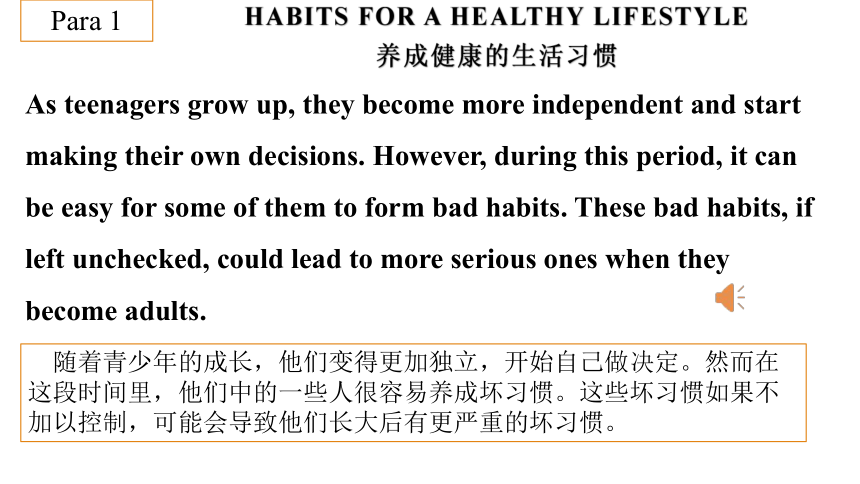(
课件网) Para 1 As teenagers grow up, they become more independent and start making their own decisions. However, during this period, it can be easy for some of them to form bad habits. These bad habits, if left unchecked, could lead to more serious ones when they become adults. 随着青少年的成长,他们变得更加独立,开始自己做决定。然而在这段时间里,他们中的一些人很容易养成坏习惯。这些坏习惯如果不加以控制,可能会导致他们长大后有更严重的坏习惯。 habits for a healthy lifestyle 养成健康的生活习惯 Para 1 For example, some of them may become involved in tobacco or alcohol abuse, which can lead to physical and mental health problems. To prevent harmful habits like these from dominating a teenager's life is essential. They must learn to recognise bad habits early and make appropriate changes. 例如,有些青少年可能会沉溺于吸烟或酗酒而不能自拔,这会造成生理或心理健康问题。防止像这样的有害习惯支配青少年的生活是至关重要的,他们必须学会及早发现坏习惯,并做出恰当的改变。 Para 2 To change bad habits is never easy, even with many attempts. There is a famous saying based on the philosophy of Aristotle: "We are what we repeatedly do." In many ways, our lifestyle is the sum of choices we have made. 改变坏习惯从来都不容易,即使尝试了很多次。有一条基于亚里士多德哲学思想的著名谚语说道:“重复的行为造就了我们。”在很多方面,我们的生活方式是我们做出的选择的总和。 Para 2 We make a choice to do something, and then we repeat it over and over again. Soon that choice becomes automatic and forms a habit that is much harder to change. The good news is that we can change, if we understand how habits work. 我们选择做某事,然后一遍又一遍的重复它,很快,那种选择就会自动形成一种更加难改变的习惯。好消息是我们可以改变,如果我们了解习惯是如何运作的。 Para 3 According to modern psychology, we must first learn about the "habit cycle", which works like this: *Firstly, there is a "cue", an action, event, or situation that acts as a signal to do something. *Secondly, there is a "routine" , the regular action you take in response to the cue. *Thirdly, there is the "reward", the good thing or feeling we get from the routine. 根据现代心理学,我们必须首先了解“习惯周期”,其工作原理如下: 首先,有一个“提示”,即充当做某事信号的动作、事件或情况。 其次,有一个“惯例”,即回应该“提示”你经常采取的行动。 第三, 有一个“奖励”,即我们从该“惯例”中得到的好东西或感觉。 Para 3 For example, when we feel unhappy (cue), we eat lots of unhealthy snacks (routine), which makes us feel happy (reward). The reward makes us much more likely to continue the cycle, and the bad habit of relying on unhealthy snacks is formed. 例如,当我们感到不快乐时(提示),我们就吃很多不健康的零食(惯例),这让我们感到快乐(奖励)。奖励使我们更有可能继续这个循环,依赖不健康零食的坏习惯也就形成了。 Para 4 To faciliate a positive change in our bad habits, we must first examine our bad habit cycles and then try to adapt them. We can do this by combining the information from our ... ...

